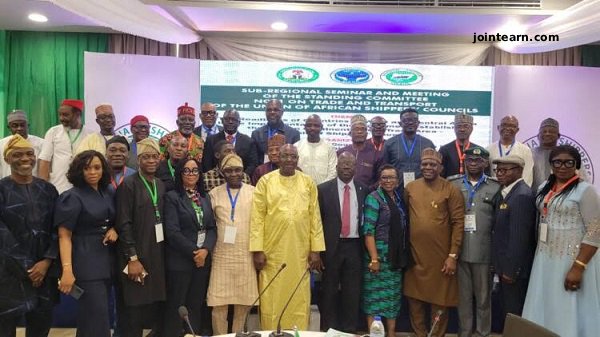
The Federal Government has urged member states of the Union of African Shippers’ Councils (UASC) to unite against arbitrary shipping surcharges and unfair freight practices that undermine trade competitiveness across West and Central Africa.
Minister of Marine and Blue Economy, Adegboyega Oyetola, made the call yesterday in Lagos while declaring open the Sub-Regional Seminar and Meeting of UASC Standing Committee No. 1. The two-day event brought together delegates from 19 countries, maritime regulators, trade agencies, and logistics experts to review strategies for deepening trade readiness under the African Continental Free Trade Area (AfCFTA).
Oyetola, represented by the ministry’s Permanent Secretary, Olufemi Oloruntola, said the time had come for regional collaboration to tackle rising shipping costs and inefficiencies that threaten the continent’s $3 trillion trade potential.
“Arbitrary surcharges and high freight rates continue to erode trade competitiveness, placing undue burdens on importers and exporters. Member states must engage shipping lines and partners to ensure transparency, fairness, and equity in freight rate determination,” he said.
The minister described AfCFTA as a “game-changing opportunity” for Africa’s transformation but warned that without coordinated reforms in port logistics and shipping cost regulation, the continent could miss out on its benefits.
Also speaking, Dr. Pius Akutah, Executive Secretary of the Nigerian Shippers’ Council (NSC), said AfCFTA offers Africa a platform to expand industrial capacity and strengthen participation in global value chains. He warned that arbitrary charges by shipping lines pose a major threat to trade growth.
“Through constructive engagement at this forum, we can develop a unified regional position that promotes fairness, transparency, and sustainability in shipping practices,” Akutah said.
UASC Secretary-General, Abdurahman Abba Kafougou, noted that the Lagos meeting builds on the resolutions of the 2024 session in Luanda, Angola, and aims to harmonise trade practices across the continent. Discussions, he said, would focus on reducing cargo delivery time, improving cross-border logistics, and ensuring proper application of Incoterms 2020.
Representatives of key agencies, including NIMASA and the Nigeria Customs Service (NCS), also pledged support for deeper collaboration. NIMASA Director-General Dayo Mobereola stressed the urgency of digitalising port operations, while NCS Comptroller-General Adewale Adeniyi called for customs reforms aligned with AfCFTA objectives to reduce trade barriers.
The two-day seminar, hosted by the Nigerian Shippers’ Council, is expected to produce policy resolutions that will guide regional maritime reforms and strengthen Africa’s position in global trade.


Leave a Reply